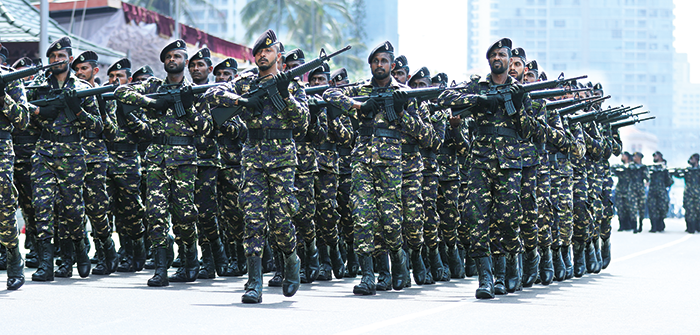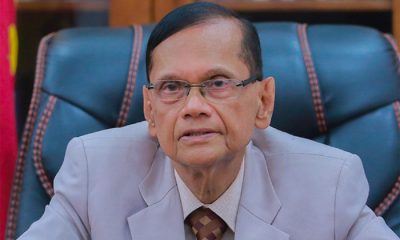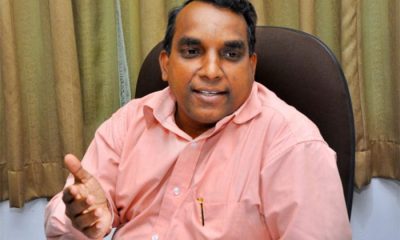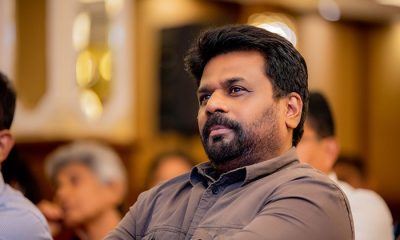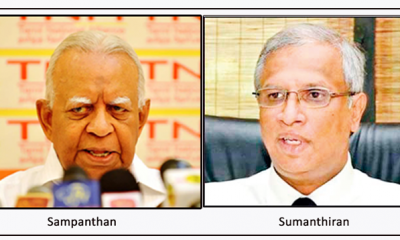Features
Election ’24: Judicial Evolution, Power Devolution, and a New Tamil Leader
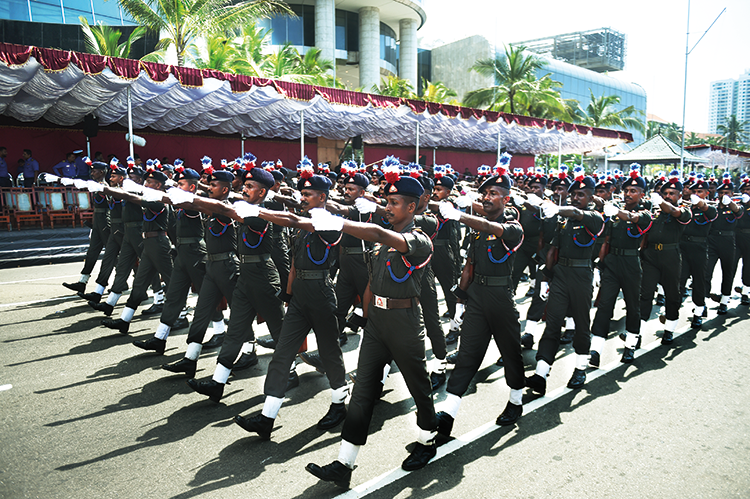
by Rajan Philips
Sunday this week marks Sri Lanka’s 76th independence anniversary. By President Ranil Wickremesinghe’s reckoning another twenty four years will have to go by before Sri Lanka’s economy could fully recovery from the man made crisis it contracted two years ago. And what is immediately ahead is a “grueling recovery path.” That is the grim warning of Dushni Weerakoon, the respected Economist.
Another Economist from abroad, Prof. Mick Moore, who coined the phrase “man-made crisis” to describe Gota’s debacle, has now advised that it is time for Sri Lanka to have an “authentic finance minister” after more than 30 years. Like the UB Wanninayake’s, NM Perera’s and Ronnie de Mel’s of old. Not the tandem Executive President / Finance Minister model of today.
Can that happen with the current presidential system? That brings us back to political square one, which is the constitution. To where I left last week and to a somewhat significant political development since. Namely, the election of Sivagnanam Shiritharan as the new leader of the Ilankai Thamil Arasu Kadchi (ITAK), the old Federal Party in English, now stuck with its Tamil only version. The election of Mr. Shiritharan, and the defeat of MA Sumanthiran, eminent lawyer and parliamentarian, has triggered editorial waves in the news media.
New Equilibrium
Depending on which glass they are looking at, pundits have described the ITAK leadership election as – either not an overwhelming victory (for Shiritharan) or as a significant defeat (for Sumanthiran). Whatever it may be, the election of Mr. Shiritharan is not going to be without political implications. That much is obvious, but what needs to be borne in mind is that the significance of these implications will vary from context to context and from issue to issue.
It would be wrong to over interpret the new leader’s misgivings the 13th Amendment and use it an excuse to shelve it without implementing it. Or to see something utmost sinister in his rhetorical assertions about Tamil nationalism and his memorialization of “Eelam national liberation fighters.” As I have argued earlier, memorialization is collective therapy after a violent experience, and hollering about it or trying to stop it is futile. The other side of the coin of memorial politics is that nothing more can be done other than commemorations.
This is the crux of the new equilibrium in the dynamic between the Sri Lankan state and the Sri Lankan Tamils that has been taking shape after 1983. Unlike pre-1983,the state is highly circumscribed in what it can and cannot do vis-a-vis the Tamils, by the emergence of the Tamil diaspora and international attention. The Tamils are no less circumscribed in what they can and cannot achieve by the same international attention and the limiting ground realities at home that weigh against the dreamy aspirations among sections of the diaspora. India obviously looms large in this picture with or without Modi and his distortion of the Mahatma’s Ram Rajya. Additionally, the nationalistic coming of age of the Muslims and the plantation Tamils has created structural curtailments on at least the territorial claims of Tamil nationalism.
The task for leadership on all sides would be to find a consociational working area within the highly constrained spaces and produce meaningful action. Ideally the task of all leaders in the current situation should be to focus on the economy, and the debate about the economy should be the focus of the election. That is unfortunately not the case and there is reasonably legitimate concern that the elections are casting “a shadow of uncertainty over economic recovery” (Dushni Weerakoon, Sunday Island, January 28). But without elections there will be the double whammy of political and economic uncertainties.
Put another way, you cannot get over the crisis of one uncertainty without dealing with the crisis of the other simultaneously. There is not going to be economic recovery without political and constitutional reforms at the same time. Therein is the timeliness of the constitutional reform proposals put forward by the Collective for Democracy and Rule of Law (CDRL). Last week, I touched on the proposals for parliamentary and presidential reforms for achieving a healthy balance of powers between the different branches of the state. The proposals also address the judiciary, judicial review of legislation, cross-over MPs, and the system for power devolution.
Judicial Evolution and Power Devolution
Of all the branches of the Sri Lankan state, the judiciary is not only the oldest but also the most evolved, and more so in the matter of devolving power. The evolutionary breakthrough was the landmark Supreme Court ruling, on August 4, 2017. Three judges of the Supreme Court, then Chief Justice Priyasath Dep, Justice Upali Abeyratne and Justice Anil Gooneratne, held that advocating for a federal form of government would not be a violation of the Sri Lankan constitution.
The judges were dismissing a petition against the Ilankai Thamizh Arasu Kadchi that it was in violation of the constitution because in advocating for a federal form government the ITAK was pursuing the goal of a separate state. The judges disagreed and pointed to the 13th Amendment as an example of devolving power without violating the constitution.
The August 2017 Supreme Court ruling could be a starting point for the new ITAK leader. A much better starting point for Mr. Shiritharan than what had been for all his predecessors who were faced with court rulings that failed to stop the legislature and the executive from violating the fundamental of minorities in cases involving citizenship, language, land and even religion.
The citizenship issue is now resolved and the estate Tamils have their own political representation. After 13A, Sri Lanka has both Sinhala and Tamil as official languages, and English is recognized as a link language. There are also moves to facilitate English as a medium of instruction for everyone by providing government funds to private schools. What is missing are functioning institutions for power devolution and local democracy. And that is because there have been no provincial council elections for nearly a decade and no local government elections since February 2018.
The Constitutional proposals respond to the current state of affairs by suggesting enshrining of the right to vote at provincial and local elections in the constitutional provisions protecting the franchise right to vote at national elections. The proposals also respond to the failure of successive ‘central governments’ to facilitate the orderly and efficient functioning of provincial council and local bodies.
The contentious issues over police and land powers can never be fully addressed or agreed upon in writing without functioning provincial councils on the ground. All elections are overdue and the proposals for implementing devolution will remain proposals until provincial elections are held and determined efforts are made to make them work. What seems to be a new mechanism in the proposals is the recommendation for including safeguards against session, including suspension of a recalcitrant provincial council by presidential proclamation, which would subject to approval by both Houses of Parliament, and review by the Constitutional Court.
The proposals seek to bring back the Constitutional Court that was the most innovative feature of the First Republican Constitution and one that could have continued in the Second (and current) Republican Constitution. That is insofar as the current constitution is partly modelled on the French Constitution that provides for preview of legislations by a constitutional court. The proposals note that there is “a welcome trend” in Sri Lanka in that “more citizens and civic organisations are coming forward to challenge Bills before the Supreme Court.
The proposals allude to permitting post-enactment judicial review of laws and Provincial statutes. That would be a big change reverting to pre-1972 traditions. And involving the Constitutional Court to handle both judicial preview of and post-enactment review of laws would be worth the effort, but the challenges should not be underestimated.
My last comment is about a matter that involves the legislature, viz., cross-over MPs. The experience of cross-over MPs and the practice of inducing crossovers with cabinet positions to secure a voting majority, are seen to have been a major factor in eroding public trust in politics in Sri Lanka. A more fundamental reason could be the qualification of candidates who end up as MPs based on a system of list-based nominations. The suggested proposals to address this by providing for a member to lose her/his seat for voting against a decision of the Party seems harsh. Forcing a member to lose seat for joining another party could be a more plausible ground for vacating the seat. The proposals do include safeguards for MPs who have contested as coalition partners. And the recommendation to hold by-elections to fill a vacated constituency seat is a welcome change.
Interestingly, comparative parliamentary studies draw a distinction between old and nascent parliamentary systems in dealing with cross-over MPs. In older, i.e., western, democracies MPs do not have to vacate their seats for voting against the party line or leaving the party that she/he entered parliament with. Not so in the so called nascent, non-western, democracies. India and Bangladesh are among them, but here at home Dr NM Perera was dead set against the provisions in the current constitution for dealing with crossover MPs and vacated seats. It was not so before 1978.
When the LSSP left the United Front government in 1976, some SLFP MPs called for the resignation of NM Perera as a Member of Parliament. He responded in style and citied the example of “illustrious predecessors: SWRD Bandaranaike, who left the UNP government to create the SLFP; and SJV Chelvanayakam, who left the Tamil Congress to start new Tamil political party – the Ilankai Thamil Arasu Kadchi. That is an appropriate segue to revisit the trajectories of Tamil political leaders, past and present.
Features
The heart-friendly health minister

by Dr Gotabhya Ranasinghe
Senior Consultant Cardiologist
National Hospital Sri Lanka
When we sought a meeting with Hon Dr. Ramesh Pathirana, Minister of Health, he graciously cleared his busy schedule to accommodate us. Renowned for his attentive listening and deep understanding, Minister Pathirana is dedicated to advancing the health sector. His openness and transparency exemplify the qualities of an exemplary politician and minister.
Dr. Palitha Mahipala, the current Health Secretary, demonstrates both commendable enthusiasm and unwavering support. This combination of attributes makes him a highly compatible colleague for the esteemed Minister of Health.
Our discussion centered on a project that has been in the works for the past 30 years, one that no other minister had managed to advance.
Minister Pathirana, however, recognized the project’s significance and its potential to revolutionize care for heart patients.
The project involves the construction of a state-of-the-art facility at the premises of the National Hospital Colombo. The project’s location within the premises of the National Hospital underscores its importance and relevance to the healthcare infrastructure of the nation.
This facility will include a cardiology building and a tertiary care center, equipped with the latest technology to handle and treat all types of heart-related conditions and surgeries.
Securing funding was a major milestone for this initiative. Minister Pathirana successfully obtained approval for a $40 billion loan from the Asian Development Bank. With the funding in place, the foundation stone is scheduled to be laid in September this year, and construction will begin in January 2025.
This project guarantees a consistent and uninterrupted supply of stents and related medications for heart patients. As a result, patients will have timely access to essential medical supplies during their treatment and recovery. By securing these critical resources, the project aims to enhance patient outcomes, minimize treatment delays, and maintain the highest standards of cardiac care.
Upon its fruition, this monumental building will serve as a beacon of hope and healing, symbolizing the unwavering dedication to improving patient outcomes and fostering a healthier society.We anticipate a future marked by significant progress and positive outcomes in Sri Lanka’s cardiovascular treatment landscape within the foreseeable timeframe.
Features
A LOVING TRIBUTE TO JESUIT FR. ALOYSIUS PIERIS ON HIS 90th BIRTHDAY

by Fr. Emmanuel Fernando, OMI
Jesuit Fr. Aloysius Pieris (affectionately called Fr. Aloy) celebrated his 90th birthday on April 9, 2024 and I, as the editor of our Oblate Journal, THE MISSIONARY OBLATE had gone to press by that time. Immediately I decided to publish an article, appreciating the untiring selfless services he continues to offer for inter-Faith dialogue, the renewal of the Catholic Church, his concern for the poor and the suffering Sri Lankan masses and to me, the present writer.
It was in 1988, when I was appointed Director of the Oblate Scholastics at Ampitiya by the then Oblate Provincial Fr. Anselm Silva, that I came to know Fr. Aloy more closely. Knowing well his expertise in matters spiritual, theological, Indological and pastoral, and with the collaborative spirit of my companion-formators, our Oblate Scholastics were sent to Tulana, the Research and Encounter Centre, Kelaniya, of which he is the Founder-Director, for ‘exposure-programmes’ on matters spiritual, biblical, theological and pastoral. Some of these dimensions according to my view and that of my companion-formators, were not available at the National Seminary, Ampitiya.
Ever since that time, our Oblate formators/ accompaniers at the Oblate Scholasticate, Ampitiya , have continued to send our Oblate Scholastics to Tulana Centre for deepening their insights and convictions regarding matters needed to serve the people in today’s context. Fr. Aloy also had tried very enthusiastically with the Oblate team headed by Frs. Oswald Firth and Clement Waidyasekara to begin a Theologate, directed by the Religious Congregations in Sri Lanka, for the contextual formation/ accompaniment of their members. It should very well be a desired goal of the Leaders / Provincials of the Religious Congregations.
Besides being a formator/accompanier at the Oblate Scholasticate, I was entrusted also with the task of editing and publishing our Oblate journal, ‘The Missionary Oblate’. To maintain the quality of the journal I continue to depend on Fr. Aloy for his thought-provoking and stimulating articles on Biblical Spirituality, Biblical Theology and Ecclesiology. I am very grateful to him for his generous assistance. Of late, his writings on renewal of the Church, initiated by Pope St. John XX111 and continued by Pope Francis through the Synodal path, published in our Oblate journal, enable our readers to focus their attention also on the needed renewal in the Catholic Church in Sri Lanka. Fr. Aloy appreciated very much the Synodal path adopted by the Jesuit Pope Francis for the renewal of the Church, rooted very much on prayerful discernment. In my Religious and presbyteral life, Fr.Aloy continues to be my spiritual animator / guide and ongoing formator / acccompanier.
Fr. Aloysius Pieris, BA Hons (Lond), LPh (SHC, India), STL (PFT, Naples), PhD (SLU/VC), ThD (Tilburg), D.Ltt (KU), has been one of the eminent Asian theologians well recognized internationally and one who has lectured and held visiting chairs in many universities both in the West and in the East. Many members of Religious Congregations from Asian countries have benefited from his lectures and guidance in the East Asian Pastoral Institute (EAPI) in Manila, Philippines. He had been a Theologian consulted by the Federation of Asian Bishops’ Conferences for many years. During his professorship at the Gregorian University in Rome, he was called to be a member of a special group of advisers on other religions consulted by Pope Paul VI.
Fr. Aloy is the author of more than 30 books and well over 500 Research Papers. Some of his books and articles have been translated and published in several countries. Among those books, one can find the following: 1) The Genesis of an Asian Theology of Liberation (An Autobiographical Excursus on the Art of Theologising in Asia, 2) An Asian Theology of Liberation, 3) Providential Timeliness of Vatican 11 (a long-overdue halt to a scandalous millennium, 4) Give Vatican 11 a chance, 5) Leadership in the Church, 6) Relishing our faith in working for justice (Themes for study and discussion), 7) A Message meant mainly, not exclusively for Jesuits (Background information necessary for helping Francis renew the Church), 8) Lent in Lanka (Reflections and Resolutions, 9) Love meets wisdom (A Christian Experience of Buddhism, 10) Fire and Water 11) God’s Reign for God’s poor, 12) Our Unhiddden Agenda (How we Jesuits work, pray and form our men). He is also the Editor of two journals, Vagdevi, Journal of Religious Reflection and Dialogue, New Series.
Fr. Aloy has a BA in Pali and Sanskrit from the University of London and a Ph.D in Buddhist Philosophy from the University of Sri Lankan, Vidyodaya Campus. On Nov. 23, 2019, he was awarded the prestigious honorary Doctorate of Literature (D.Litt) by the Chancellor of the University of Kelaniya, the Most Venerable Welamitiyawe Dharmakirthi Sri Kusala Dhamma Thera.
Fr. Aloy continues to be a promoter of Gospel values and virtues. Justice as a constitutive dimension of love and social concern for the downtrodden masses are very much noted in his life and work. He had very much appreciated the commitment of the late Fr. Joseph (Joe) Fernando, the National Director of the Social and Economic Centre (SEDEC) for the poor.
In Sri Lanka, a few religious Congregations – the Good Shepherd Sisters, the Christian Brothers, the Marist Brothers and the Oblates – have invited him to animate their members especially during their Provincial Congresses, Chapters and International Conferences. The mainline Christian Churches also have sought his advice and followed his seminars. I, for one, regret very much, that the Sri Lankan authorities of the Catholic Church –today’s Hierarchy—- have not sought Fr.
Aloy’s expertise for the renewal of the Catholic Church in Sri Lanka and thus have not benefited from the immense store of wisdom and insight that he can offer to our local Church while the Sri Lankan bishops who governed the Catholic church in the immediate aftermath of the Second Vatican Council (Edmund Fernando OMI, Anthony de Saram, Leo Nanayakkara OSB, Frank Marcus Fernando, Paul Perera,) visited him and consulted him on many matters. Among the Tamil Bishops, Bishop Rayappu Joseph was keeping close contact with him and Bishop J. Deogupillai hosted him and his team visiting him after the horrible Black July massacre of Tamils.
Features
A fairy tale, success or debacle

Sri Lanka-Singapore Free Trade Agreement
By Gomi Senadhira
senadhiragomi@gmail.com
“You might tell fairy tales, but the progress of a country cannot be achieved through such narratives. A country cannot be developed by making false promises. The country moved backward because of the electoral promises made by political parties throughout time. We have witnessed that the ultimate result of this is the country becoming bankrupt. Unfortunately, many segments of the population have not come to realize this yet.” – President Ranil Wickremesinghe, 2024 Budget speech
Any Sri Lankan would agree with the above words of President Wickremesinghe on the false promises our politicians and officials make and the fairy tales they narrate which bankrupted this country. So, to understand this, let’s look at one such fairy tale with lots of false promises; Ranil Wickremesinghe’s greatest achievement in the area of international trade and investment promotion during the Yahapalana period, Sri Lanka-Singapore Free Trade Agreement (SLSFTA).
It is appropriate and timely to do it now as Finance Minister Wickremesinghe has just presented to parliament a bill on the National Policy on Economic Transformation which includes the establishment of an Office for International Trade and the Sri Lanka Institute of Economics and International Trade.
Was SLSFTA a “Cleverly negotiated Free Trade Agreement” as stated by the (former) Minister of Development Strategies and International Trade Malik Samarawickrama during the Parliamentary Debate on the SLSFTA in July 2018, or a colossal blunder covered up with lies, false promises, and fairy tales? After SLSFTA was signed there were a number of fairy tales published on this agreement by the Ministry of Development Strategies and International, Institute of Policy Studies, and others.
However, for this article, I would like to limit my comments to the speech by Minister Samarawickrama during the Parliamentary Debate, and the two most important areas in the agreement which were covered up with lies, fairy tales, and false promises, namely: revenue loss for Sri Lanka and Investment from Singapore. On the other important area, “Waste products dumping” I do not want to comment here as I have written extensively on the issue.
1. The revenue loss
During the Parliamentary Debate in July 2018, Minister Samarawickrama stated “…. let me reiterate that this FTA with Singapore has been very cleverly negotiated by us…. The liberalisation programme under this FTA has been carefully designed to have the least impact on domestic industry and revenue collection. We have included all revenue sensitive items in the negative list of items which will not be subject to removal of tariff. Therefore, 97.8% revenue from Customs duty is protected. Our tariff liberalisation will take place over a period of 12-15 years! In fact, the revenue earned through tariffs on goods imported from Singapore last year was Rs. 35 billion.
The revenue loss for over the next 15 years due to the FTA is only Rs. 733 million– which when annualised, on average, is just Rs. 51 million. That is just 0.14% per year! So anyone who claims the Singapore FTA causes revenue loss to the Government cannot do basic arithmetic! Mr. Speaker, in conclusion, I call on my fellow members of this House – don’t mislead the public with baseless criticism that is not grounded in facts. Don’t look at petty politics and use these issues for your own political survival.”
I was surprised to read the minister’s speech because an article published in January 2018 in “The Straits Times“, based on information released by the Singaporean Negotiators stated, “…. With the FTA, tariff savings for Singapore exports are estimated to hit $10 million annually“.
As the annual tariff savings (that is the revenue loss for Sri Lanka) calculated by the Singaporean Negotiators, Singaporean $ 10 million (Sri Lankan rupees 1,200 million in 2018) was way above the rupees’ 733 million revenue loss for 15 years estimated by the Sri Lankan negotiators, it was clear to any observer that one of the parties to the agreement had not done the basic arithmetic!
Six years later, according to a report published by “The Morning” newspaper, speaking at the Committee on Public Finance (COPF) on 7th May 2024, Mr Samarawickrama’s chief trade negotiator K.J. Weerasinghehad had admitted “…. that forecasted revenue loss for the Government of Sri Lanka through the Singapore FTA is Rs. 450 million in 2023 and Rs. 1.3 billion in 2024.”
If these numbers are correct, as tariff liberalisation under the SLSFTA has just started, we will pass Rs 2 billion very soon. Then, the question is how Sri Lanka’s trade negotiators made such a colossal blunder. Didn’t they do their basic arithmetic? If they didn’t know how to do basic arithmetic they should have at least done their basic readings. For example, the headline of the article published in The Straits Times in January 2018 was “Singapore, Sri Lanka sign FTA, annual savings of $10m expected”.
Anyway, as Sri Lanka’s chief negotiator reiterated at the COPF meeting that “…. since 99% of the tariffs in Singapore have zero rates of duty, Sri Lanka has agreed on 80% tariff liberalisation over a period of 15 years while expecting Singapore investments to address the imbalance in trade,” let’s turn towards investment.
Investment from Singapore
In July 2018, speaking during the Parliamentary Debate on the FTA this is what Minister Malik Samarawickrama stated on investment from Singapore, “Already, thanks to this FTA, in just the past two-and-a-half months since the agreement came into effect we have received a proposal from Singapore for investment amounting to $ 14.8 billion in an oil refinery for export of petroleum products. In addition, we have proposals for a steel manufacturing plant for exports ($ 1 billion investment), flour milling plant ($ 50 million), sugar refinery ($ 200 million). This adds up to more than $ 16.05 billion in the pipeline on these projects alone.
And all of these projects will create thousands of more jobs for our people. In principle approval has already been granted by the BOI and the investors are awaiting the release of land the environmental approvals to commence the project.
I request the Opposition and those with vested interests to change their narrow-minded thinking and join us to develop our country. We must always look at what is best for the whole community, not just the few who may oppose. We owe it to our people to courageously take decisions that will change their lives for the better.”
According to the media report I quoted earlier, speaking at the Committee on Public Finance (COPF) Chief Negotiator Weerasinghe has admitted that Sri Lanka was not happy with overall Singapore investments that have come in the past few years in return for the trade liberalisation under the Singapore-Sri Lanka Free Trade Agreement. He has added that between 2021 and 2023 the total investment from Singapore had been around $162 million!
What happened to those projects worth $16 billion negotiated, thanks to the SLSFTA, in just the two-and-a-half months after the agreement came into effect and approved by the BOI? I do not know about the steel manufacturing plant for exports ($ 1 billion investment), flour milling plant ($ 50 million) and sugar refinery ($ 200 million).
However, story of the multibillion-dollar investment in the Petroleum Refinery unfolded in a manner that would qualify it as the best fairy tale with false promises presented by our politicians and the officials, prior to 2019 elections.
Though many Sri Lankans got to know, through the media which repeatedly highlighted a plethora of issues surrounding the project and the questionable credentials of the Singaporean investor, the construction work on the Mirrijiwela Oil Refinery along with the cement factory began on the24th of March 2019 with a bang and Minister Ranil Wickremesinghe and his ministers along with the foreign and local dignitaries laid the foundation stones.
That was few months before the 2019 Presidential elections. Inaugurating the construction work Prime Minister Ranil Wickremesinghe said the projects will create thousands of job opportunities in the area and surrounding districts.
The oil refinery, which was to be built over 200 acres of land, with the capacity to refine 200,000 barrels of crude oil per day, was to generate US$7 billion of exports and create 1,500 direct and 3,000 indirect jobs. The construction of the refinery was to be completed in 44 months. Four years later, in August 2023 the Cabinet of Ministers approved the proposal presented by President Ranil Wickremesinghe to cancel the agreement with the investors of the refinery as the project has not been implemented! Can they explain to the country how much money was wasted to produce that fairy tale?
It is obvious that the President, ministers, and officials had made huge blunders and had deliberately misled the public and the parliament on the revenue loss and potential investment from SLSFTA with fairy tales and false promises.
As the president himself said, a country cannot be developed by making false promises or with fairy tales and these false promises and fairy tales had bankrupted the country. “Unfortunately, many segments of the population have not come to realize this yet”.
(The writer, a specialist and an activist on trade and development issues . )

